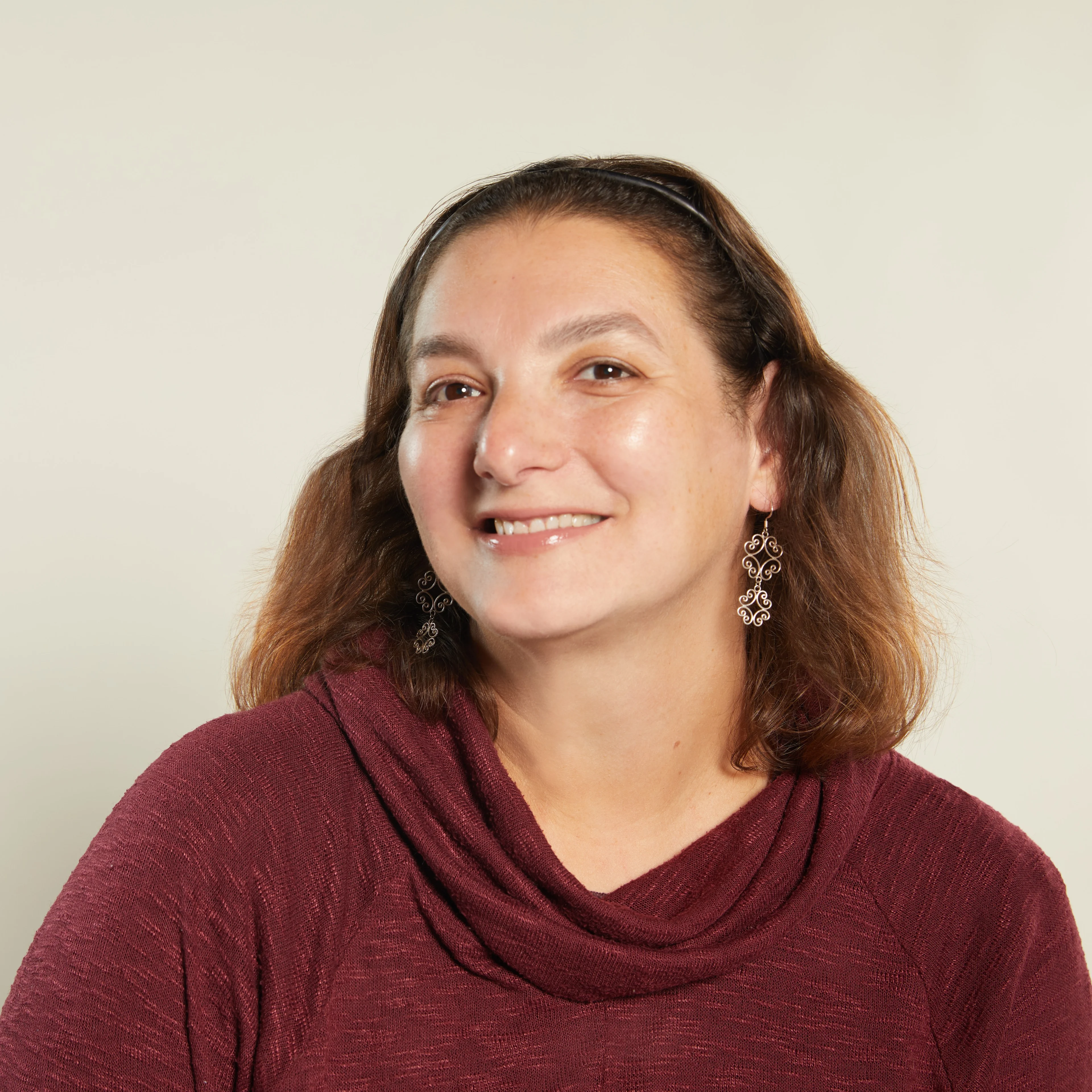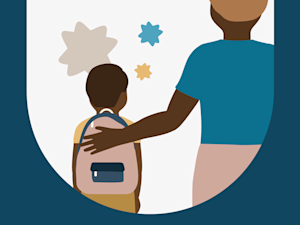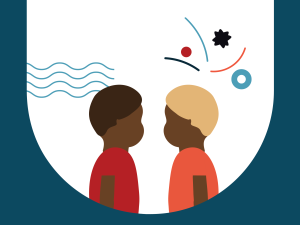Stay in the know
All our latest podcasts delivered right to your inbox.
How do schools evaluate kids for special education? What’s the process like? How do families get started? Season 1 of our new podcast, Understood Explains, answers these questions and more.
In this bonus episode, Amanda Morin and Gretchen Vierstra talk with Dr. Andy Kahn, a psychologist who spent nearly 20 years evaluating kids for schools. Andy shares why he’s excited to host Season 1 of Understood Explains, which breaks down the special education evaluation process for families. Tune it to learn more about the podcast, evaluations, and misconceptions families often have about special education.
Related resources
Episode transcript
Amanda: Hi. I'm Amanda Morin.
Gretchen: And I'm Gretchen Vierstra.
Amanda: And we are the hosts of "In It," from the Understood Podcast Network.
Gretchen: Officially, we're between seasons right now, but you're hearing from us because we want to share a sneak preview of a new Understood podcast we're very excited about.
Amanda: It's called "Understood Explains." It's hosted by Dr. Andy Kahn, and we have Andy sitting right here next to me to tell us all about it. Andy, welcome to "In It."
Andy: Thanks.
Gretchen: Yay Andy!
Amanda: So, Andy, before we get into the podcast, maybe you can just briefly tell us a little bit about yourself.
Andy: Sure. So, I'm a licensed psychologist and I've been in practice for over 20 years. I spent the better part of that 20 years working within the school systems. So, doing evaluations, consultation, and supporting families within our communities. So, came to Understood to become a subject matter expert in learning and psychology.
Gretchen: So, then can you tell us a little bit about this new podcast you're hosting?
Andy: So, there's a lot to say about this podcast. The purpose of the podcast is really two major points. We're breaking down the special education evaluation process primarily for parents to give them information about, you know, what does it look like? How does that referral process work? How do we make those decisions? Should we do an evaluation? Should we not? Helping parents learn about their rights. And the second, really most important part is, helping them communicate with their kids about that process. That's where we fold in Amanda, who joins us and talks about all of those things. What can you say to your kids? How do you make them a part of the process?
Amanda: Andy, I also know that you've really wanted to do something like this for a long time. Tell me why.
Andy: Yeah. So, you know, having done evaluations for years, I've done thousands of evaluations. And it was no easy decision to walk away from schools to do this kind of work. But in a word, I was really focused on impact. The idea that the process that I did with my families over the years was something that was highly cooperative and collaborative. So much of it was about giving them information so that they could be involved and they could be calm in the process and feel relaxed enough to know, What are we doing this for? How are we going to make this really work for my child? So, for me, so much of this is about taking what I felt that I was really proud of doing for so many years in my evaluations and putting together a podcast that could help parents, you know, learn things about the process to really maximize the impact and to absolutely reduce the anxiety. So, we have psychologists, school psychologists, special ed teachers, administrators, who come in and give us input about the process and then we bounce out with you, Amanda. You know, the parent perspective, plus how to talk to your kids.
Gretchen: Yeah. Can you give us a sneak peek into some of the topics of the different episodes?
Andy: We've got 10 episodes, and the episodes start with things like understanding, making the decision about do I want to do an evaluation process? And understanding that an evaluation process can start from a parent requesting it or from the school saying, "Hey, we're seeing something. We'd like to request this process." We talk about parents' rights and you know, what is it that you are allowed to do? What is it that you have a right to receive? And what are the schools supposed to do in this process with you so that you can protect your rights? You know, no one's going to assume that a school is looking to do anything but the best for their kids. But sometimes things go wrong and parents, if they have that knowledge, can really keep the process honest and on track.
Amanda: So speaking of knowledge, we keep using the word evaluation. Can you tell us what that means? Because I just realized we haven't even covered that yet.
Andy: Yeah, yeah. And I think evaluation is one of the words that we use. We use evaluation or assessment. People might say testing and you know, all these words that become really highly charged. And evaluation is really where we're looking at what the child's skills are in certain areas, which could be anywhere from academic skills, social-emotional skills, overall behavioral functioning, and for other professionals, things like speech and language evaluations or occupational therapy or even physical therapy. So, there's a lot of bits and pieces that go into understanding how a child can be successful and the things that could be factors in their daily functioning.
Gretchen: Certainly not just one little test a child takes and it's done. It's a process, right?
Andy: Absolutely. And it's a process that has a lot of moving parts and lots of people. So, I think that, you know, for a parent who might not be in the room because their kid's doing the assessment, the more they can know, the more comfortable they can feel and the more input they can have. So, it's yeah, that we have to unpack that and that's a great question.
Amanda: Can you talk a little bit about what sorts of misconceptions parents and caregivers might bring to this process before they understand it?
Andy: Yeah, sure. You know, everyone who enters this process, and from the parent perspective, something I learned that really came home from doing so many assessments, was that parents were once students. So, their experience of having been students — or maybe if they had challenges with learning and thinking differences — things have changed a lot over the years. The experience for people of my age going through school could have been very different from what their kids are going through right now.
Amanda: It's such a good point, right? Because I think a lot of parents, especially in a certain age bracket, they think special education means you're in a separate room, you're in a separate place of the building, that you don't get to be with the other kids at the same age, that it's a different kind of instruction. And that's not the case anymore.
Andy: And it once was, you know, as a kid going to New York City schools when I was young, you know, it was if a kid got identified for services, you really might not have seen them again, except maybe after school or on the way to school. So, for parents who might or might not have had, you know, a positive experience in their own education, it really becomes a loaded process. And you have to take that into account. You know the primary thing that I think that always echoed with me is how are the parents responding to this process? What does it lead them to feel emotionally? And then in turn, you know, having a child is like having your heart on the outside of your chest.
Amanda: Oh, yes.
Andy: So, you know, if your child is now being asked to go through a process, maybe you've went through or things that you have, you know, beliefs that are based on when you went to school that can be really, really unsettling. And to give parents the right information so they can know that they're in charge of making decisions is incredibly powerful.
Gretchen: What do parents most often struggle with around this process? What tends to be the bumpiest parts along the way?
Andy: For parents of much younger children — the one thing I'll say that I noticed my entire career — little kids don't mind leaving a classroom. They don't mind getting the extra support.
Amanda: They love it. As a kindergarten teacher, I can tell you that they loved being the one walking out with the person, they loved it.
Andy: You know, for so many parents, it's often the idea about "I don't want my kid to be labeled. I don't want my kid to look different. I don't want my kid to be picked on because we find that they have something that they need that's different than other kids." And I think that people perceive the process and the outcomes as being public, that somehow because you're doing it, everybody knows.
Amanda: It's that permanent record thing that people think about, right? There's a permanent and I will just be the first one to admit that as a parent, I know that fear. And I was a teacher, I was an educator, I was in special education. And when I first did this with my first child, I went through evaluation, I had this like, "Nope, nope, don't want to do that. Don't want that label, don't." But, you know, people like you Andy make it easier for us to understand like it's not a permanent record situation.
Andy: And I think some of us would say that, you know, we're building in the idea of expectation that's realistic and putting people in the position to ask questions that builds comfort. And I think that in and of itself, if you're comfortable enough to say, "I don't understand this" or "This scares me," or "Heck no, I don't want my kid to get that," then it gives us the opportunity to make... the process can be therapeutic, right? It can be, If we're going through this process together and we're learning about your child together, can you come to a conclusion about "Wow, you know, my kid wasn't just refusing work because they're naughty or because they're a pain or because of some momentary frustration we all experience as parents." But it's more about "Well, I didn't know my kid wasn't able to process that information or struggles with reading or can't focus without support." So, I think that a well-done evaluation is a therapeutic process, and I think that we can't underestimate the impact of that.
Amanda: I'm going to turn the tables and ask Gretchen a question if you don't mind. Did you participate in these processes as a teacher?
Gretchen: Yes.
Amanda: What was it like for you on that side?
Gretchen: Yeah. Sometimes families were really invested and interested in getting the evaluation done. And so, they were super involved from the beginning and talking to me about it and gathering the information. But then there were other families who were scared. This was the first time that anyone was bringing up that perhaps their child struggled with something. And for some families hearing that, it was hard to take, right? Because lots of families envision their child as, quote unquote, perfect, right? And then you're told, well, wait a minute, we actually want to find ways to better support your child. And for some of these families, it was like, "What? What do you mean? They're not excelling at every single thing without any kind of support? Because that's what I expected."
Andy: Right. Absolutely.
Gretchen: You know? And so, it could be tough sometimes to just be part of that process with them because it was scary.
Amanda: So, Andy, for teachers like Gretchen or me, because I did this as a teacher too, and I'm going to admit that when I first started, I didn't understand what my role as a teacher was. What is their role in this process, and do you have advice or practices to share with them?
Andy: You know, I think the first thing that I would share with teachers across the board is, any time you're going to involve yourself in the process, take a moment to imagine it's your child who's being evaluated first. That empathic approach says, okay, this is sensitive. This is something where you're describing something that could feel critical, like you're giving some sort of negative description of someone's child and really sharing from the very, very beginning that we are focused on making your child's success our goal. And I think really saying "We are working together. This is not a tug of war. We're not on opposite sides of the rope. You and I are both pulling the rope in the same direction. But if you're not sure or you're uncomfortable with part of this, let's talk that through." And teachers can often say, you know, kids who have had this kind of testing, who have found that they have differences, they really can benefit. There's a lot of stuff we can do in reassuring them about what it's going to lead to. Yeah. So, there's, you know, there's a little bit of benefit in just understanding, "You know what? Your kid is going to manage this fine if we support them the right way. It's much harder to break your kids than you think," you know.
Gretchen: Right. Yeah.
Andy: Yeah. And I think that one of the keys in terms of being successful as a teacher, as a psychologist, as a parent, is always being focused first on what you like about the child. And I'll be completely forthright, I've worked with some extremely challenging kids, and I can say that with very high certainty, I really, really learned to love all of these kids because they all have something about them that's cool and interesting. And for us to be successful, focusing on those things is important. And let me tell you about what we can do that might be helpful to your child or something. And let me tell you about something we may need to do to help your child. So for teachers, we've got a lot to offer them. And just to reset, right? It's just a little reset for your brain, because this is benevolent people looking to help kids.
Gretchen: For the teachers listening, I do want to say that it's okay to not know, right? And I remember starting off and being handed a form like, "Okay, we're going to be evaluating this kid. I need to fill out this test, check out these things." And like what? What is this? If you haven't been trained and you're not familiar with what you're supposed to do, then talk to someone and find out because you don't want to go at it alone and you want to do a great job for the family. So, finding an ally who can help you is great.
Andy: And think about it, just let's zoom out here for a second. You know, think about what that looks like for kids with learning and thinking differences. They don't know something, so they get anxious and they don't want to step out and make a mistake. But what we're saying across the board here is "If you don't know, that's okay."
Amanda: That was part of the fun of being able to come on and have those conversations with Andy, is we unpacked some of that. We looked at how as a parent, do you look at what you need to learn, and then how do you pass that on to your child?
Andy: And the best part about that is when you have multiple perspectives talking about something like that. Amanda, you come up with things that I wasn't thinking of in that moment. So, when we bring in the experts at the beginning of each session, then we have Amanda and I chatting, I think for me, the greatest surprise about it was I kept learning things about perspectives that I wasn't taking. You know, as much as I've done this my whole career, I kept stumbling across bits and pieces like, "Okay, that's cool. I never thought about it that way," You know? And I think that's really what's powerful about this, is getting people who know a lot of stuff to talk together because none of us by ourselves knew enough to tell you everything.
Gretchen: So last but not least, Andy, how can people get your podcast?
Andy: Our podcast it's on Apple, Spotify, and wherever you get your podcasts.
Amanda: Part of the Understood Podcast Network.
Gretchen: Yay, it's everywhere, people!
Gretchen: Andy, thank you so much for joining us on "In It" to talk about your podcast "Understood Explains." We're so excited for people to listen to it.
Andy: Thanks so much for having me.
Amanda: Thanks for listening to "In It," part of the Understood Podcast Network. And remember, there's lots more where this came from. You can find all our past episodes by subscribing to "In It" wherever you get your podcasts or on our website, go to Understood.org/podcast/in-it.
Gretchen: We'll be back very soon with Season 4 of the show. A reminder, it's not too late to let us know what topics you'd like us to cover. Is there something you've been struggling with or wanting to celebrate that you think would be of interest to other folks who are in it? Send us an email at init, that's one word, i-n-i-t @understood.org with your suggestions.
Amanda: In It is produced by Julie Subrin. Briana Berry is our production director. Justin D. Wright mixes the show. Mike Errico wrote our theme music. For the Understood Podcast Network, Laura Key is our editorial director. Scott Cocchiere is our creative director, and Seth Melnick is our executive producer.
Gretchen: Thanks for listening, everyone. And thanks for always being in it with us.
Hosts

Gretchen Vierstra, MA
is the managing editor at Understood and co-host of the “In It” podcast. She’s a former educator with experience teaching and designing programs in schools, organizations, and online learning spaces.

Rachel Bozek
is co-host of the “In It” podcast and the parent of two kids with ADHD. She has a background in writing and editing content for kids and parents.
Latest episodes
April 25, 2024
Learn about common reasons families might look for a special education attorney and what their other options are.

April 11, 2024
Learn ways to advocate for your child at school while maintaining a good relationship with their teachers.

March 28, 2024
The track and field gold medalist shares her story and talks about ADHD, dyslexia, and building confidence.

March 14, 2024
The hosts interview kids’ book author Lindsey Rowe Parker. She talks about her new picture book about sensory differences in kids.

February 29, 2024
Understanding what a language disorder means for your child can be overwhelming. Here’s help from an expert.

February 15, 2024
Talking with your child about their diagnosis of a learning and thinking difference can be tough. Get advice from an expert.

February 1, 2024
How can you manage the challenges of having one child who learns and thinks differently and one child who doesn’t? Get advice from an expert.

January 18, 2024
Any sibling relationship can be hard to manage. But what happens when one of the siblings has a learning or thinking difference? Here’s one mom’s story.

January 4, 2024
Overwhelmed by talking with your child’s pediatrician about ADHD or learning differences? These tips can help.

December 14, 2023
Tantrums and meltdowns are challenges all parents face. Get tips for projecting calm when kids and teens have tantrums.
